Related Research Articles

European influence in Afghanistan has been present in the country since the Victorian era, when the competing imperial powers of Britain and Russia contested for control over Afghanistan as part of the Great Game.
The following lists events that happened during 1911 in Afghanistan.

Inayatullah Khan, was the King of Afghanistan for three days in January 1929. He was the son of former Afghan Emir, Habibullah Khan. Inayatullah's brief reign ended with his abdication.

Ghazi Amanullah Khan was the sovereign of Afghanistan from 1919, first as Emir and after 1926 as King, until his abdication in 1929. After the end of the Third Anglo-Afghan War in August 1919, Afghanistan was able to relinquish its protected state status to proclaim independence and pursue an independent foreign policy free from the influence of the United Kingdom.

Abdul Rahman Pazhwak was an Afghan poet and diplomat. He was educated in Afghanistan and started his career as a journalist, but eventually joined the foreign ministry. During the 1950s, he became ambassador to the United Nations and served as president of the UN General Assembly from 1966 to 1967. During the early 1970s, he served for short periods as Afghan ambassador to West Germany and India. In 1976, he became ambassador to the United Kingdom. He served in that position until the 1978 Saur Revolution. He then returned to Afghanistan and was put under house arrest. He was allowed to leave for medical treatment in 1982 and received asylum in the United States, where he lived until 1991, before moving to Peshawar, Pakistan. Abdul Rahman Pazhwak died in Hayatabad in Peshawar on 8 June 1995. He was in Baghwani village off Surkh Road in Nangarhar Province, Afghanistan.
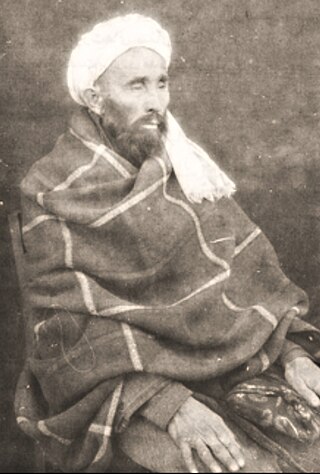
Faiz Muhammad Kāteb also known as Kāteb (کاتب) was a contemporary writer and historian. He was Afghan court chronicler, a skilled calligrapher and secretary to Habibullah Khan from 1901 to 1919.
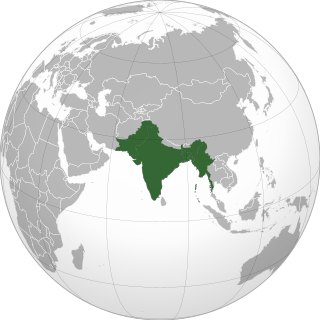
The Provisional Government of India was a provisional government-in-exile established in Kabul, Afghanistan on December 1, 1915 by the Indian Independence Committee during World War I with support from the Central Powers. Its purpose was to enrol support from the Afghan Emir as well as Tsarist Russia, China, and Japan for the Indian Movement. Established at the conclusion of the Kabul Mission composed of members of the Berlin Committee, German and Turkish delegates, the provisional government was composed of Mahendra Pratap as President, Maulana Barkatullah as Prime Minister, Deobandi Maulavi Ubaidullah Sindhi as Home Minister, Deobandi Maulavi Bashir as War Minister, and Champakraman Pillai as Foreign Affairs Minister. The provisional government found significant support from the internal administration of the Afghan government, although the Emir refused to declare open support, and ultimately, under British pressure it was forced to withdraw from Afghanistan in 1919.
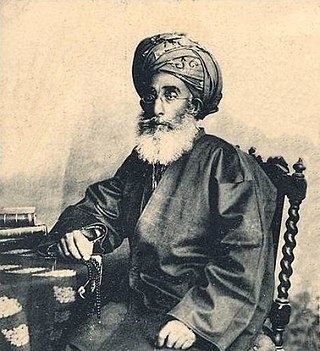
Sardar Ghulam Muhammad Khan Tarzi son of Sardar Rahim Dil Khan was a ruler of Kandahar. He was a Pashtun soldier, poet, and military leader in Afghanistan. He is often credited with developing the traditional family name 'Tarzi,' which played a critical role in the history of Afghanistan.

Nanguyalai Tarzi – was a high-ranking Afghan diplomat who was the Afghan Ambassador to Switzerland and Permanent Representative to the United Nations office and other international organisations in Geneva. Tarzi has been the Ambassador of Afghanistan to India, and before that he was Permanent Representative to United Nations at Geneva and Afghan Ambassador to Switzerland, Ambassador of Afghanistan to Pakistan and Director of the United Nations Information Centres (UNIC) in Tehran, Iran. From 1980s to 1990s, Tarzi was Permanent Observer of Organisation of Islamic Cooperation (OIC) to the United Nations, Geneva, Switzerland and United Nations, Vienna, Austria and Senior Political Adviser and Deputy Permanent Observer of OIC to the United Nations, New York, United States of America. In the 1970s, Tarzi was the Afghan Diplomat in Washington D.C., United States of America.
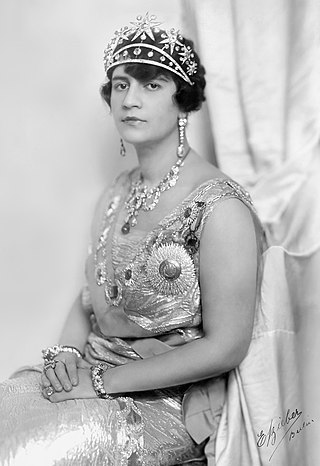
Soraya Tarzi was the first queen consort of Afghanistan as the wife of King Amanullah Khan. She played a major part in the modernization reforms of Amanullah Khan, particularly in regard to the emancipation of women.
The following lists events that happened during 1914 in Afghanistan.
The following lists events that happened during 1953 in Afghanistan.
The mass media in Afghanistan includes broadcasting, digital and printing. It is mainly in Dari and Pashto, the official languages of the nation. It was reported in 2019 that Afghanistan had over 107 TV stations and 284 radio stations, including 100s of print media and over 1,800 online media outlets. After the return of the Islamic Emirate of Afghanistan in 2021, there was a concern that the mass media will significantly decrease in the country. The numbers of digital media outlets are steadily increasing with the help of Facebook, Instagram, TikTok, Twitter, YouTube, and other similar platforms.
Abdul Hadi Dawi was an Afghan poet, diplomat and government official. His works were published under his pen name, Pareshan (worried).
The Great Game: Afghanistan is a British series of short plays on the history of Afghanistan and foreign intervention there, from the First Anglo-Afghan War to the present day. It is organised into three sets of four plays and draws its name from the 19th and 20th century Great Game, a geopolitical struggle for dominance between The British and Russian Empires. The main plays are linked by monologues and duologues giving historical background and verbatim theatre edited by Richard Norton-Taylor from modern figures linked with western involvement in Afghanistan, such as William Dalrymple, Hillary Clinton, Stanley McChrystal and David Richards.
Bārakzai is the name of a Pashtun tribe from present-day, Kandahar, Afghanistan. '"Barakzai" is a common name among the Pashtuns and it means "son of Barak" in Pashto. According to the Encyclopædia Iranica, "In the detailed Pashtun genealogies there are no fewer than seven instances of the ethnic name Bārakzī, at very different levels of tribal segmentation. Six of them designate simple lineages within six different tribes located in the Solaymān mountains or adjacent lands... The seventh instance, on the other hand, designates one of the most important Pashtun tribes in numbers and historic role, part of the Zīrak branch of the Dorrānay confederation.
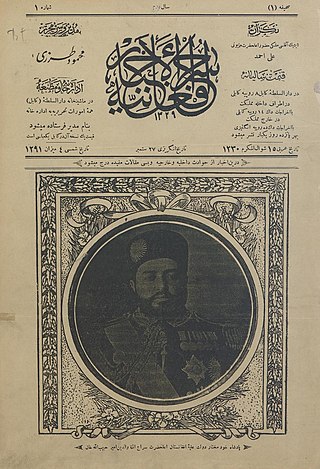
Seraj al Akhbar was a Persian newspaper that circulated in Kabul, Afghanistan from 1911–1919. Published in 1911, the newspaper was founded by Mahmud Tarzi as an attempt at modernization, with the support of Emir Habibullah Khan. It was primarily a political newspaper, purposing to keep the country informed about international affairs, and the current events of the country. Seraj al Akhbar promoted Pan-Islamism, and supported the young Turks coalition in the Ottoman Empire. As the first recognized newspaper in the country, Seraj al Akhbar is regarded as the founding of the Afghan press.

Mahmud Tarzi was an Afghan politician and intellectual. He is known as the father of Afghan journalism. He became a key figure in the history of Afghanistan, following the lead of Mustafa Kemal Atatürk in Turkey by working for modernization and secularization, and strongly opposing religious extremism and obscurantism. Tarzi emulated the Young Turks coalition.

Afghan literature or literature of Afghanistan refers to the literature produced in the Islamic Emirate of Afghanistan. Influenced by Central and South Asian literature, it is predominantly written in two native and official languages of Afghanistan, Dari and Pashto. Some regional languages such as Uzbek, Turkmen, Balochi, and Pashayi also appears in Afghan literature. While Afghanistan is a multilingual country, these languages are generally used as oral compositions and written texts by the Afghan writers and in Afghan curriculum. Its literature is highly influenced by Persian and Arabic literature in addition to Central and South Asia.
References
- ↑ "Mahmud Tarzi and Saraj-ol-Akhbar: Ideology of Nationalism and Modernization in Afghanistan" by Vartan Gregorian, Middle East Journal, Summer, 1967, Vol. 21, No. 3 (Summer, 1967), pp. 345.
- 1 2 "Afghanistan’s Early Reformists" by Thomas Ruttig, Afghanistan Analysts Network, April 2011, page 1.
- 1 2 Afghanistan. (1970). Afghanistan: Historical Society of Afghanistan., p85